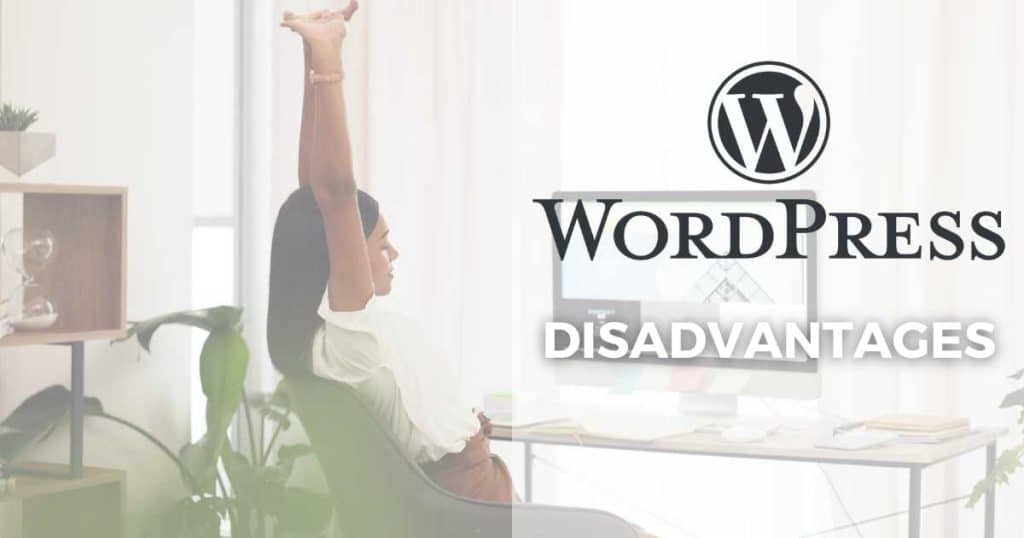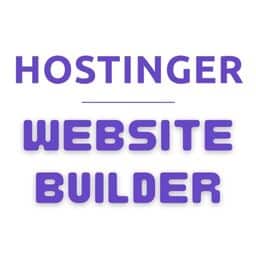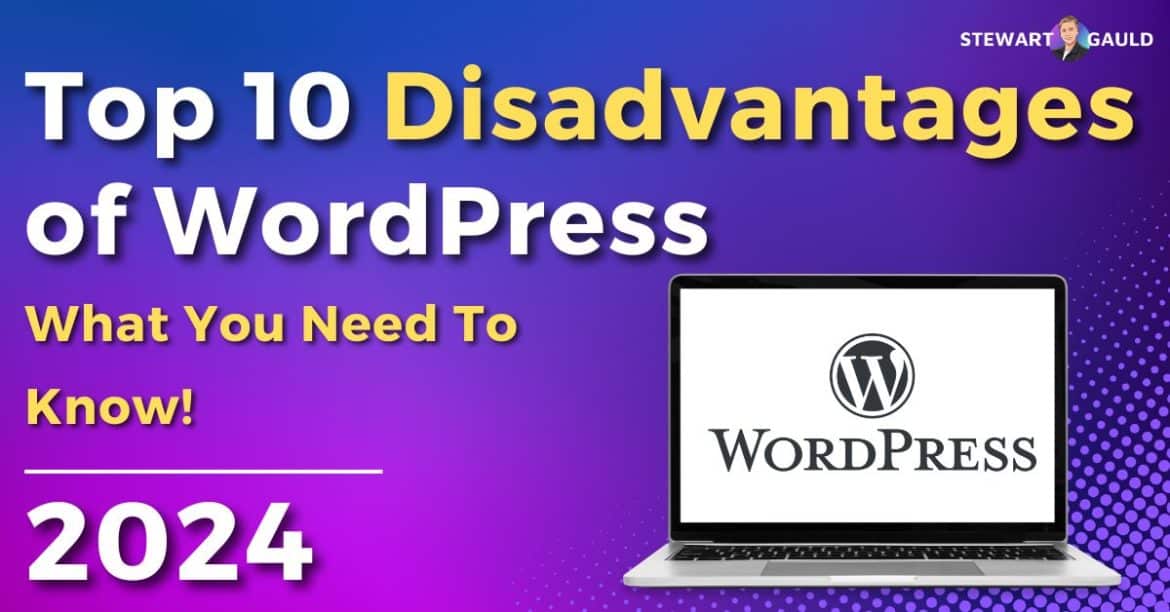What are the top 10 disadvantages of WordPress?
If you’ve been contemplating starting a new blog or website, you’ve likely come across countless articles suggesting you use WordPress.
Don’t get me wrong, there are many advantages to using WordPress!
But is WordPress the best website-building choice for you and your business? Not necessarily!
Like all online platforms, there are crucial disadvantages you should know about!
But what are the top 10 WordPress disadvantages?
Top 10 Disadvantages of WordPress

Many users rave about WordPress. However, it’s not perfect!
Therefore, it’s essential to understand the disadvantages of WordPress before diving in headfirst.
Which is where I step in!
In this article, I will share a list of WordPress cons so you can decide if it’s the right choice for you and your business requirements.
So, what are the 10 disadvantages of WordPress? Let’s find out.
Read more: WordPress.org vs Wordpress.com.
Stew’s Recommended WordPress Alternatives

Best Online Store Website Builder
Shopify is a simple, versatile and powerful Ecommerce website builder for all sizes of business. Launch your website in just a few clicks.
Claim your FREE 3-day trial and 1 months for only $1 per month!

Most Affordable All-in-one Website Builder
Hostinger offers a powerful website builder and AI tool kit for small businesses wanting a responsive and full feature website.
Get 3 months free plus claim your discount with my code: STEWARTGAULD

Most Extensive WordPress AI Builder
10Web's AI Website Builder merges the ease of AI and the extensive web design capabilities of WordPress together. Ideal for complete customization freedom.
Claim your 7-day free trial below and see if 10Web + WordPress is for you.
1. Complexity For Beginners
The first Wordpress limitation relates to how easy the platform is to use.
WordPress is an open-sourced CMS (content management system) that allows for greater customization and flexibility.
And although this is one of WordPress’s biggest advantages for experience users, it can be a drawback for beginners.
WordPress’s countless themes, plugins, and settings, can overwhelm beginners or users who are unfamiliar with web design and development.
Figuring out how the WordPress dashboard works (and how elements, plugins, and themes interact) also requires a steeper learning curve.
Plus, beginners may find troubleshooting or customizing their website difficult without previous WordPress structure and functionality experience.
Read more: Advantages Of Shopify Over WordPress.
2. Cost

Second on this WordPress cons list is the price!
WordPress is initially an attractive option as it’s free to use.
However, what some users may not know is you must buy and manage your own hosting, domain name, themes, and plugins.
Therefore, building a WordPress website can quickly add up!
The costs vary depending on the complexity of your site, customization requirements, and ongoing maintenance.
For example:
- Domain names cost between $10 and $70 per year.
- Web hosting can vary from $3 to $25 per month.
- Paid plugins and themes can cost anywhere from $20 to $200+.
If you want custom designs or development work to build your website, you may need to hire a developer!
Plus, you may need continued professional help to assist with ongoing maintenance and regular updates.
As you can see, all these costs can add up!
If cost is a priority for you, WordPress may not be the best choice.
I would suggest checking out fully hosted website builders like Wix or Squarespace, which generally include these costs within their plans.
3. Vulnerability To Security Risks

This Wordpress disadvantage article is an important one!
Did you know that sites created by WordPress are more susceptible to security vulnerabilities and attacks?
Studies show that over 70% of WordPress websites are actually prone to online attacks and malware!
This is due to its open-sourced nature, where anyone can create their own themes or plugins, and the fact that over 40% of all sites on the Internet are powered by WordPress.
Although WordPress regularly releases updates to enhance functionality and security, you must manage this by adding anti-virus plugins.
WordPress users must prioritize regular updates, implement strong security measures, and stay informed about the latest security practices.
But even then, you’re not guaranteed to eliminate all potential dangers and threats!
4. Plugin Compatibility and Credibility
While plugins can extend the functionality of a WordPress website, not all plugins are of the same quality.
Which brings me to the next WordPress limitation!
It can be challenging (especially for beginners!) to distinguish between high-quality plugins and those that may pose security risks.
Some plugins may be outdated, poorly coded, or not regularly updated, making them susceptible to vulnerabilities.
Moreover, compatibility issues can arise when integrating multiple plugins, leading to conflicts or unexpected behavior on the website.
To avoid this WordPress con, it is crucial to:
- Research and select reputable plugins from trusted sources.
- Read reviews.
- Ensure plugins are regularly updated and supported.
5. Need For Regular Updates and Backups

And we’re halfway! Now for the 5th disadvantage of WordPress.
To ensure security and compatibility, WordPress and its plugins require frequent updates.
However, WordPress doesn’t back up or update your site for you, which means you have to do it, which is super time-consuming!
Plus, every time you update your WordPress plugins and themes, you risk potentially causing compatibility issues or clashes.
Therefore, I always recommend backing up your website before updating or adding anything to your site to avoid clashes.
Read more: How To Backup Your WordPress Website.
6. Limited Functionality
WordPress is undoubtedly a powerful platform. However, another disadvantage of WordPress is its limited functionality!
These limitations mainly stem from its focus on being a CMS with blogging capabilities at its core.
WordPress has evolved and expanded its features over time.
However, it still doesn’t offer the same level of flexibility for complex functionalities compared to other specialized platforms.
While plugins can extend your site’s functionality to some extent, they may not always fully address specific needs or requirements.
Additionally, heavily customized designs or functionalities may require technical expertise or development workarounds.
Therefore, WordPress may not be the most suitable platform for streamlining day-to-day business operations.
7. Limited Scalability

This WordPress con is simple – it doesn’t give the same level of scalability as other custom-built websites.
Once your website grows in size and complexity, managing and scaling it on WordPress can become more challenging.
As a result, it may require additional optimization techniques.
Plus, WordPress relies heavily on plugins to extend its functionality.
Therefore, you might run into problems if no suitable plugins are available for your specific needs.
While it’s suitable for small to medium-sized websites, larger and more complex websites with high traffic loads may issues.
8. Website Speed
The speed of WordPress websites is certainly another WordPress disadvantage!
In fact, many users share the same concerns regarding slow WordPress website speeds.
One of the primary reasons for having a slow WordPress website is attributed to poor-quality hosting providers that can’t handle your website’s traffic efficiently.
Insufficient caching mechanisms, outdated plugins, and the absence of image compression and optimization can also impact your website speed.
Read more: Elementor Hosting Review.
9. SEO Difficulty

Implementing effective SEO practices is another WordPress disadvantage, despite its SEO-friendly features.
In other words, correctly optimizing your website for search engines requires a lot of time and effort!
WordPress websites need to be constantly adjusted to ensure they’re search-engine friendly.
Plus, you’ll need to keep on top of regularly identifying and rectifying incorrect tags, keywords, and accidental content duplication.
WordPress websites require additional optimization to improve load times and overall performance, especially for larger and more complex sites.
It’s also important to note that these plugins can only address some aspects of optimization comprehensively.
For example, they can’t directly improve website speed or eliminate issues related to bloated code or security threats.
Read more: How To Add Meta Title And Description In WordPress.
10. Lack Of Dedicated Support
The last disadvantage of using WordPress is the lack of dedicated customer support!
This is due to the platform being an open-source platform.
Sure, WordPress has an active community of users and developers willing to help.
But you won’t receive the same level of personalized and direct support as commercial platforms!
This means you must rely on forums, online documentation, and community-driven resources to troubleshoot issues and find solutions.
Some businesses with specific or complex needs may require immediate and customized support.
Unfortunately, this isn’t possible with WordPress (unless you hire a costly web developer).
Stews Final Thoughts
And there you have it! That brings this article on my top 10 disadvantages of WordPress to a close.
After reviewing the disadvantages of WordPress, it’s essential to keep in mind that, like any platform, there certainly are WordPress limitations.
And while it’s clear that WordPress isn’t perfect, there are also numerous advantages to using WordPress!
After all, there must be a reason why so many websites choose WordPress, right?
Of course, focusing solely on WordPress’s disadvantages can make it seem worse than it genuinely is.
It’s crucial to consider the pros to balance out the cons!
Check out my top 10 WordPress advantages article to get a complete picture of the platform before deciding whether it’s the best fit for you.
Thanks so much for reading.

